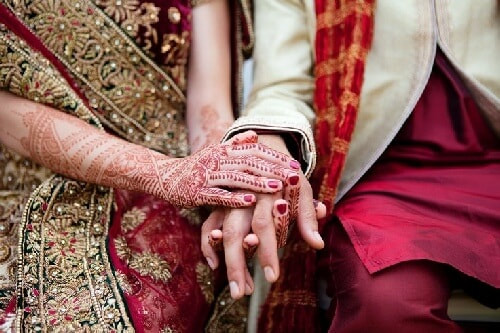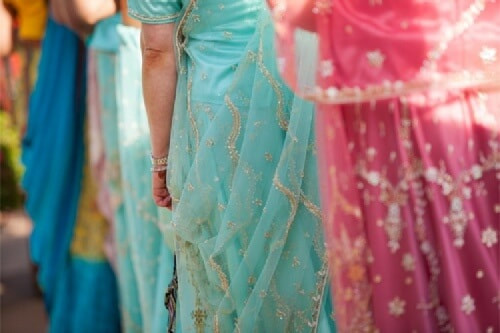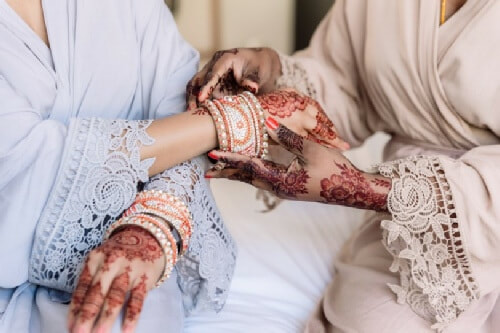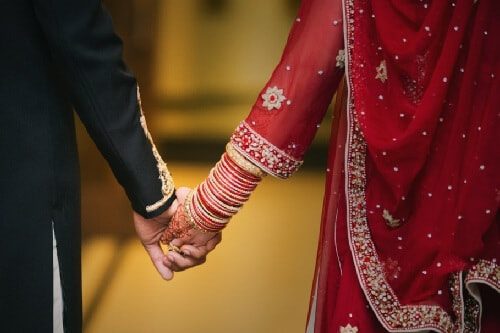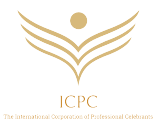The Indian Wedding
With nearly over 500 languages and 6,000 dialects, the diverse cultures and religions of India shape today’s wedding ceremonies, Indian weddings vary based on their region of origin. Many various rituals which make part of an Indian wedding ceremony also take place over several days.
As one of the world’s most religiously and diverse lands, India boasts about their unique, culturally rich wedding ceremonies that go from elegant and sophisticated. Part of this complexity comes from the concept that in Indian when a couple marries, entire families and local communities are involved. |
“In Indian a wedding is traditionally considered a marriage of not just a couple but two families”.
It starts with the engagement, this is the first of many unique steps, often a lengthy process, which serves as an agreement not just between the couple but the two families.
Once the wedding date is set, the rituals begin, often fifteen days before the wedding with the first being the Barni Band-Hwana.
A piece of thread called the Mauli, is tied to the hands of the groom and his parents, this is to request a safe and humble wedding day from the gods.
It starts with the engagement, this is the first of many unique steps, often a lengthy process, which serves as an agreement not just between the couple but the two families.
Once the wedding date is set, the rituals begin, often fifteen days before the wedding with the first being the Barni Band-Hwana.
A piece of thread called the Mauli, is tied to the hands of the groom and his parents, this is to request a safe and humble wedding day from the gods.
The first Sangeet & Mehendi, is for the relatives and friends to come together, this party is hosted by the bride’s family, it is used as a time for introduction of family members to each other. there is music, dancing, and singing.
At the Sangeet, the bride will take part in a Mehendi Ceremony, she, and the other ladies, in her family will come together for the traditional marking of the Henna. The intricate designs on the hands and feet are believed to ward off evil, and promote fertility, they attract good energy for the wedded couple.
Within the beautiful bespoke artwork, are both the bride and groom’s names, they are hidden, the groom’s task is to find the names… they say the deeper the colour of the henna, the stronger the love will be between the couple, and the also the relationship between the bride and her new mother-in-law will flourish.
At the Sangeet, the bride will take part in a Mehendi Ceremony, she, and the other ladies, in her family will come together for the traditional marking of the Henna. The intricate designs on the hands and feet are believed to ward off evil, and promote fertility, they attract good energy for the wedded couple.
Within the beautiful bespoke artwork, are both the bride and groom’s names, they are hidden, the groom’s task is to find the names… they say the deeper the colour of the henna, the stronger the love will be between the couple, and the also the relationship between the bride and her new mother-in-law will flourish.
Baraat
A Ceremony within a ceremony, the groom will ride a white horse, and make a grand entrance, his family and friends will all sing and usher him in a long line… dancing and shouting of traditional well wishes…. the groom will be dressed in a long jacket called a Sherwani, fitted trousers called Churidards. he also will wear a safa, turban on his head, with a brooch called a Kalgi. This is an amazing and spectacular event…
Milni Malas
This is where the bride and her family greet the groom and they exchange Milni Malas… many floral garlands which each wear around their necks… this is a symbol of their acceptance of one another…
The bride’s parents and her family all welcome the groom and his family, they then escort the groom and his parents, siblings, and close family to their place of honour beside the altar.
The Ceremony – Under the Mandap
When the weather is good, Hindu weddings take place under a canopy outside known as the Mandap, if this cannot be done outside, one is built indoors. The four pillars of the canopy represent one of the four parents.
Immediate family members stand up at the Mandap during the ceremony, the father is already at the altar, so it is often the maternal uncle of the bride who will escort down the aisle.
The brother of the bride will place rice in the hands of his sister and the groom, they will turn and then throw the rice into the ceremonial fire pit.
The Celebrant, couple, parents all sit beneath the Mandap, there will be a small fire, contained in a brazier or dish, “Agni” the god of fire, is known for sustaining life, thus giving life to the marriage.
A Ceremony within a ceremony, the groom will ride a white horse, and make a grand entrance, his family and friends will all sing and usher him in a long line… dancing and shouting of traditional well wishes…. the groom will be dressed in a long jacket called a Sherwani, fitted trousers called Churidards. he also will wear a safa, turban on his head, with a brooch called a Kalgi. This is an amazing and spectacular event…
Milni Malas
This is where the bride and her family greet the groom and they exchange Milni Malas… many floral garlands which each wear around their necks… this is a symbol of their acceptance of one another…
The bride’s parents and her family all welcome the groom and his family, they then escort the groom and his parents, siblings, and close family to their place of honour beside the altar.
The Ceremony – Under the Mandap
When the weather is good, Hindu weddings take place under a canopy outside known as the Mandap, if this cannot be done outside, one is built indoors. The four pillars of the canopy represent one of the four parents.
Immediate family members stand up at the Mandap during the ceremony, the father is already at the altar, so it is often the maternal uncle of the bride who will escort down the aisle.
The brother of the bride will place rice in the hands of his sister and the groom, they will turn and then throw the rice into the ceremonial fire pit.
The Celebrant, couple, parents all sit beneath the Mandap, there will be a small fire, contained in a brazier or dish, “Agni” the god of fire, is known for sustaining life, thus giving life to the marriage.
The Celebrant will start by requesting the bride’s parents to give away the bride, this is called Kanya Daan.
The Bride and Groom join hands, in a circle around the fire, this ritual is called Mangalphera, they then walk around the fire, four times each turn represents a goal in life.
As this is performed, the Pandit, will chant verses, during the ceremony, they will also tie the couple together of with the scarfs they are wearing, as this finishes their walk around the fire. The couple return to their seats, it is said whoever sits first will be the dominant one in the marriage.
- Dharma – morality
- Artha – prosperity
- Kama – personal gratification
- Moksha - spirituality
As this is performed, the Pandit, will chant verses, during the ceremony, they will also tie the couple together of with the scarfs they are wearing, as this finishes their walk around the fire. The couple return to their seats, it is said whoever sits first will be the dominant one in the marriage.
Havan
Many are given, a mix of rice, herbs and flowers which will be offered into the holy fire.
Saptapadi
They take 7 steps as they vow to support each other in love and life, living happily together. The steps represent a marital vow, a promise of commitment, to care for each other. The Celebrant will offer a blessing of prosperity, happiness, harmony friendship and children.
Mangalsutra
The groom applies a red powder to the centre of his bride’s forehead, and tie’s a necklace made of gold and black beads, sometimes diamonds around her neck. This will symbolize that she is now a married woman, this is his gift to her.
It is now that family and friends, can throw flowers to honour the couple…
Reception Feast
Often a buffet is served at an Indian wedding, there are normally several appetizers, entrees, and rice, yogurt, salad, and different types of bread. Indian cookies, sweets, silver wrapped cashews, kaju and fig filled cookie’s, cheese, and nuts…
Many are given, a mix of rice, herbs and flowers which will be offered into the holy fire.
Saptapadi
They take 7 steps as they vow to support each other in love and life, living happily together. The steps represent a marital vow, a promise of commitment, to care for each other. The Celebrant will offer a blessing of prosperity, happiness, harmony friendship and children.
Mangalsutra
The groom applies a red powder to the centre of his bride’s forehead, and tie’s a necklace made of gold and black beads, sometimes diamonds around her neck. This will symbolize that she is now a married woman, this is his gift to her.
It is now that family and friends, can throw flowers to honour the couple…
Reception Feast
Often a buffet is served at an Indian wedding, there are normally several appetizers, entrees, and rice, yogurt, salad, and different types of bread. Indian cookies, sweets, silver wrapped cashews, kaju and fig filled cookie’s, cheese, and nuts…
The Reception Feast
An Indian wedding menu is often served buffet style since many items involve a gravy sauce or “Makhani” and would be difficult to serve pre-plated. A typical menu might feature seven to 10 appetizers followed by four or five main entrées, plus rice, yogurt, salad, and naan, a type of bread.
At the end of the meal, a wide variety of Indian cookies and sweets are served, such as silver-wrapped cashews, kaju, which is a fig-filled cookie, halva, and others made from heavy cream, cheese, and nuts.
A DJ, photographer, videographer is present like most western weddings, the party begins… Indian weddings are not a small gathering, as many as three to five hundred guests are normally invited.
There are many different, rituals at these weddings, all individual to the families involved.
An Indian wedding menu is often served buffet style since many items involve a gravy sauce or “Makhani” and would be difficult to serve pre-plated. A typical menu might feature seven to 10 appetizers followed by four or five main entrées, plus rice, yogurt, salad, and naan, a type of bread.
At the end of the meal, a wide variety of Indian cookies and sweets are served, such as silver-wrapped cashews, kaju, which is a fig-filled cookie, halva, and others made from heavy cream, cheese, and nuts.
A DJ, photographer, videographer is present like most western weddings, the party begins… Indian weddings are not a small gathering, as many as three to five hundred guests are normally invited.
There are many different, rituals at these weddings, all individual to the families involved.
|
Bou Bhat
After the celebrations are over, the following afternoon the groom’s family and friends are invited to lunch, with the close relatives of the bride. This is when the bride is formally invited into the family, and the groom pledges his responsibility to her in the form of food, clothing, pledging this he gifts her a new sari and serves her food. The Aashirwad This is the exchanging of gifts, the bride’s family and friends go to the grooms’ parents’ home and give him their blessing along with a token gift, in return the groom’s parents go to the bride’s house and offer their blessings. the bride is often given gold or diamonds from his parents. |
Although this may all seem, a long and lengthy process, Indian weddings are just about intertwining rituals and traditions, providing each couple a lasting lesson of wisdom.
Find a Civil Celebrant |
Find your Perfect Venue |
Become a Celebrant! |
|
Celebrant Training Courses
|
Celebrant Services
|
Useful Links
|
Our NOCN Center Number is ICP Celebrants 30003224
©
The International Corporation of Professional Celebrants Limited. All Rights Reserved. Company No. 12693562 | Web Design by Line of Vision

